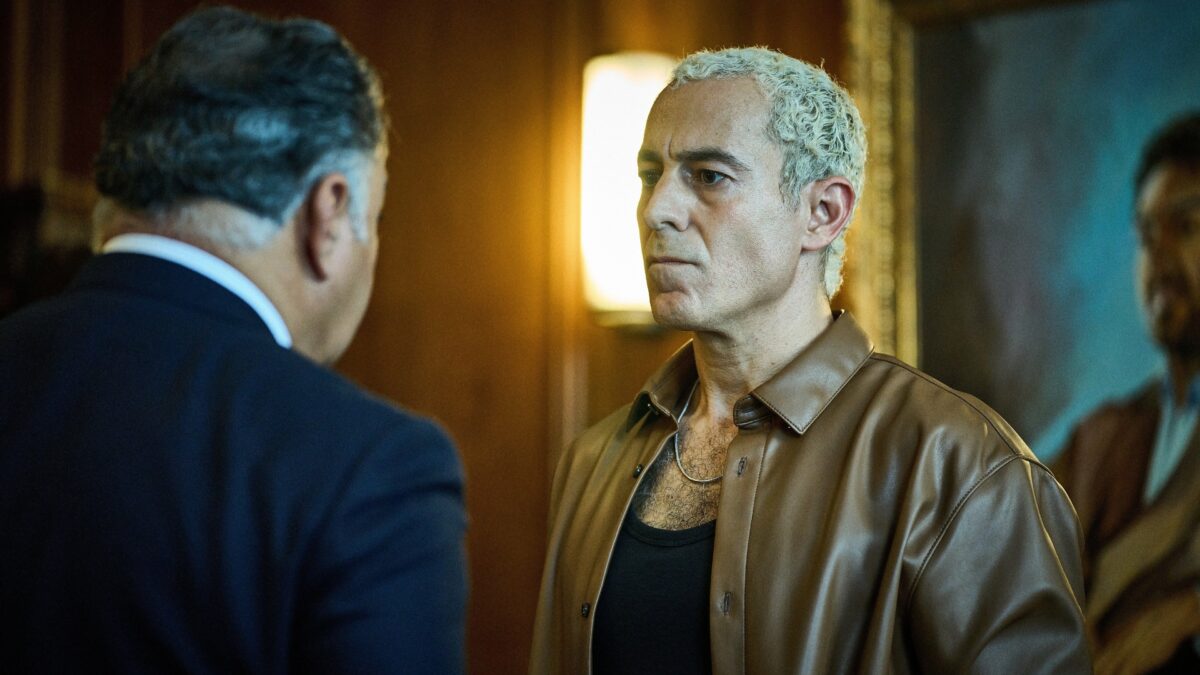Gangs of London
Season 2
Episode 2
Needed that like a hole in the head
The first shot of Gangs of London S2 E2 is pretty inspired, NGL.
In the pro forma “previously on” montage, recapping the pertinent events of the story up to this point, we close on the image of Alex’s body crumpled at the bottom of the high-rise he jumped from; Elliot’s outstretched hand grasping futilely after him. Blood splatter fans out to frame his lifeless corpse. From there, we cut to black, and then… to a top-down shot of Billy relaxing in a pool outside a sunny, Mediterranean villa. He’s splayed on a flotation aid shaped like a pink clamshell, dressed in a red shirt and swimming trunks, and motionless enough that he might be mistaken for dead.
Now that, ladies and gentlemen, is how you do a thematic and emotionally-freighted match cut. Billy Wallace was one of the few characters to escape the violence at the end of Season 1 unscathed, fleeing the country with his pregnant sister Jacqueline when he saw the way the wind was blowing.
We know Billy is historically an unhappy person (something that Brian Vernel reliably captures with his hooded eyes and down-twisted lips). He’s a heroin addict struggling to keep a lid on his recovery, full of self-loathing at his uselessness to his family. (He’s also gay, which can’t have made life easier for him growing up in an environment obsessed with empire-building and dynastic succession.) The one really consequential decision he made in Season 1 – trusting Elliot with Sean’s location at the Reno – backfired spectacularly. For someone already inclined to depression and dissolution, of course he feels like a member of the living dead. Of course he’d smother himself with luxury and pleasure, permitting himself to stew in grief and self-recrimination for having failed his brother so completely.
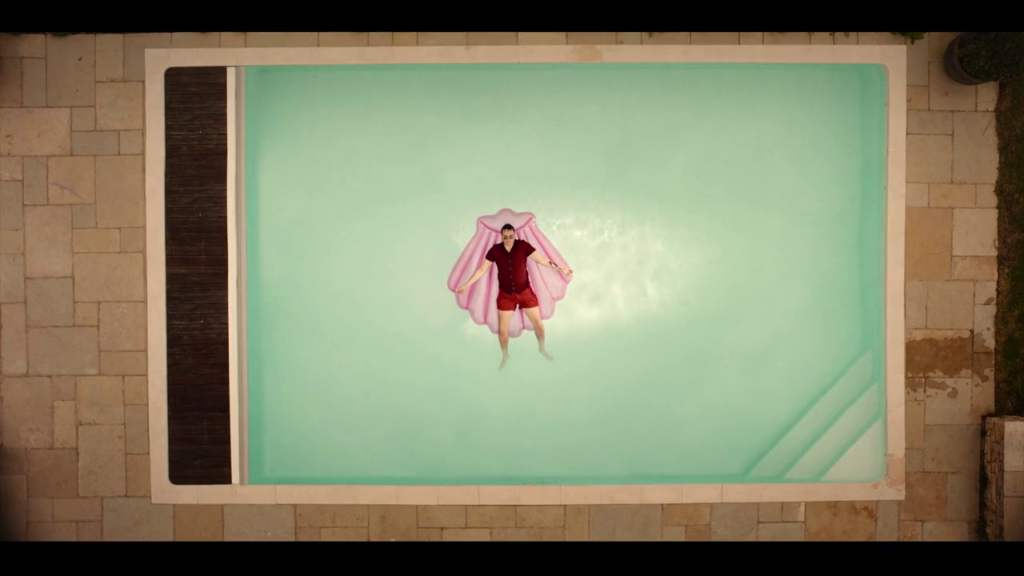
That’s all evoked by a single image and a strategic cut. Corin Hardy (here directing his third consecutive episode, and his last for a while) has proven by this point that he has a good eye for the world and the characters of Gangs of London. He gets what makes these characters tick, and he’s able to sum them up in pithy, bold, expressive images. He’s not a subtle director, but this show doesn’t want a subtle director. He’s the kind of steward that this series needs as its writing becomes increasingly opaque and contrived.
[Hardy]’s the kind of steward that this series needs as its writing becomes increasingly opaque and contrived.
It makes sense that Billy wants revenge on Elliot, and that when he learns Elliot is back in London, he’d set out to kill him. That’s firmly in line with this character and his motivations at this point in the story. What makes much less sense is how he becomes involved. Marian sends a messenger inviting him back to the UK, where Billy is reunited with his mother. She assigns him to a squad of her ex-IRA loyalists, who give him a gun and task him with assassinating Elliot.
Marian, naturally, is the one funnelling weapons to Luan. Having survived her confrontation with Ed in Season 1 (somehow), she’s back, and directing a vengeful insurgency against the Investors. The comparisons to A Song of Ice and Fire keep piling up. Where Sean Wallace was analogous to Robb Stark, Marian Wallace is now well into the “Lady Stoneheart” phase of Catelyn Stark’s character development that Michelle Fairley never got to play on TV.
Stonehearted or not, I don’t buy that Marian would deploy Billy to the frontlines the way she does here. Billy isn’t a trained killer; his Irish handlers even comment that it doesn’t make sense to send him after Elliot, a military-trained international hitman. It’s a counterintuitive thing for Marian to do, strategically as well as emotionally; if anything, I’d have expected her to try to prevent Billy going after Elliot, out of protective, maternal instinct. For the story to take this turn feels really, transparently artificial, like the writers needed Billy back in the picture and just went with the first-draft idea that occurred to them.
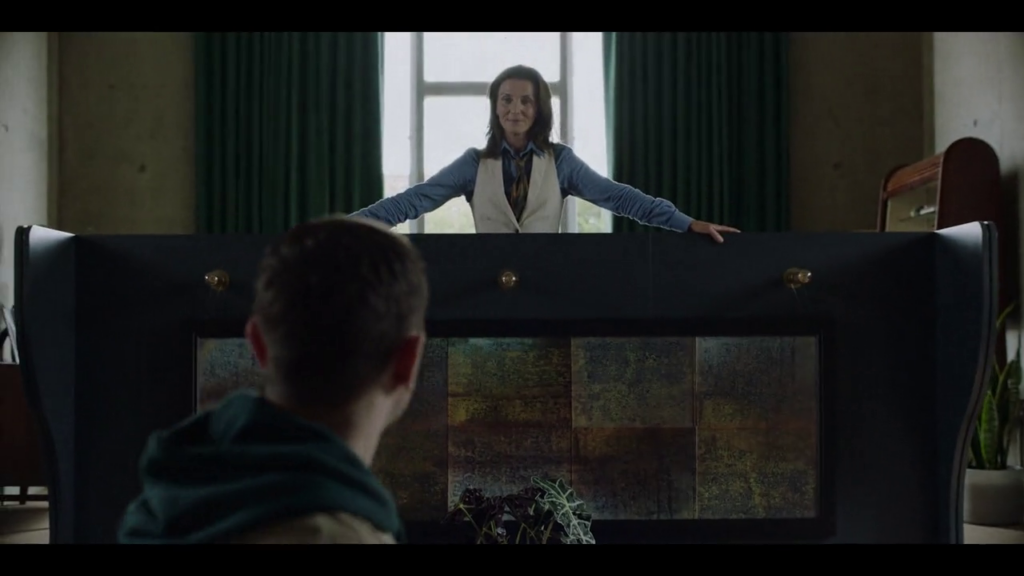
Marian Wallace is now well into the “Lady Stoneheart” phase of Catelyn Stark’s character development that Michelle Fairley never got to play on TV.
Speaking of Elliot, he’s been requisitioned to help Koba search for the mysterious assassin in a red BMW who’s been making hit-and-run attacks on him and his crew. Elliot grudgingly lends his aid, as a former detective, but in a moment when he doesn’t feel Ms. Kane’s eyes singeing the back of his neck, he arranges a rendezvous with Singer, brokering his terms to testify against the Investors. The guilt of acting as the Investors’ on-call killer has become unbearable; he wants out, but only if Singer can guarantee his Dad’s safety and transit to Jamaica.
I continue to enjoy Elliot’s dynamic with his Dad, and the scene that they share at the residential home is quite heartwarming (Ṣọpẹ́ Dìrísù and Jude Akuwudike have terrific chemistry together, believable as a father and son who authentically love each other, even as they’re both pretending to be tougher than they are).
As long as I’m talking about performances, I really ought to spend a paragraph on Lucian Msamati as Ed Dumani. Reading back my reviews in this series so far, I’m surprised that I haven’t singled him out for praise; Msamati is maybe the most reliable presence on the whole show, embodying Ed as a character possessed of weary stoicism and quiet dignity, eminently sensible and competent and taking no pleasure in the ruthlessness required of him. Watching S2 E2, I was struck by his reaction to learning about Alex’s suicide (from Asif, no less, projecting as much false sympathy and oleaginous smarm as ever). There’s no outburst; no outpouring of grief; Ed would never behave in such an unbecoming way in front of a business partner. There’s just the slump of the shoulders; the dull, downcast eyes. Only when he’s back in the privacy of his car does he allow himself gestures as emotive as rapid blinking and shallow breathing, his hand fidgeting with his mouth. Msamati conveys undercurrents of intense, turbulent emotion in the kind of understated gestures Gangs of London seldom allows. He’s more sympathetic in that moment, more persuasively human, than just about any other player in the cast. He’s not an operatic figure; not a hero or a villain; just a tired man with a lot of responsibilities, trying to keep it together from one trial to the next.
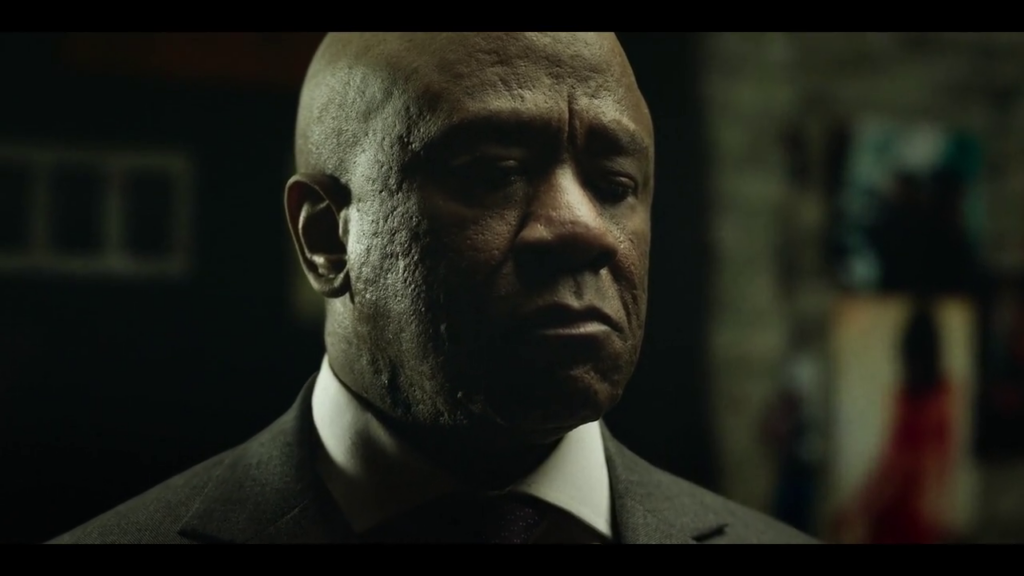
The plot at this point is mostly the sort of place-setting and piece-moving you’d expect of an early-season episode. While Elliot and Billy are running around, so is Luan. With Koba holding his wife hostage, he traps and interrogates his Irish liaison with Marian, torturing him until he reveals her location. Also: Floriana’s back, standing shoulder-to-shoulder with Marian as she tends to Finn’s bastard child. She’s helping to finance Marian’s operation with the funds Finn sequestered for his elopement; funds that Asif has traced back through the lawyer acting as a proxy for the account (by way of torture; natch).
And amidst it all are the Algerians, new characters for Season 2; the small-time players who’ve been made patsies by Luan’s gun-smuggling deal. There’s Faz, who we met in the opening of S2 E1, who has a weeping, post-traumatic meltdown when Koba shows up in his family’s place of business. There’s his sister Saba (Jasmine Armando), precocious and wilful and looking for retribution for the death of Marco (the man Koba forced Faz to shoot). There’s Basem (Salem Kali), the head of the family. And there’s Hakim (Aymen Hamdouchi), Basem’s lieutenant who sold their family out to Koba.

Honestly: I find it difficult to care about the new Algerian characters. Not because they’re badly written, or badly performed. But their drama has been squeezed into the interstices of a plot that was already crowded.
Complication is a requirement of drama; particularly of long-form, serialised drama like a prestige TV show. If you have a story that spans eight hours, there needs to be multiple angles on its conflict, lest it become monotonous and dull.
But there’s a sweet spot. Past a certain point, returns diminish, and two hours into Gangs of London second season, it feels like all it has are complications where there ought to be stakes. It’s a chaotic jumble of characters whose motives and goals jostle for position. Lots of conflict from moment to moment, but little sense of the big picture; of what outcomes I, as a viewer, am being primed to anticipate or hope for.
…two hours into Gangs of London second season, it feels like all it has are complications where there ought to be stakes.”
The episode’s crescendo is a shootout set in a dockside fish market, and it epitomises the show’s problems at this stage. It’s a good enough action scene on its technical merits (albeit brief); intense and well-edited and compellingly bloody.
But the narrative content of it is frustratingly muddy. The order of events goes, roughly: Saba meets with Basem to warn him about Hakim’s treachery. While they’re sharing a tender moment, Basem is suddenly shot dead by a hooded figure whose face remains out of frame (implied to be the assassin in the red BMW Elliot is after). Elliot arrives on the scene too late, and tries to escort an inconsolable Saba out of the market…
…only to be confronted by Billy in a service corridor, brandishing a gun. He shoots at Elliot, misses, and ends up getting chased through the market by Koba’s henchmen, innocent bystanders getting mown down around him by automatic weapon fire. He finally “escapes” when his car crashes into the Thames, his Irish driver full of holes.
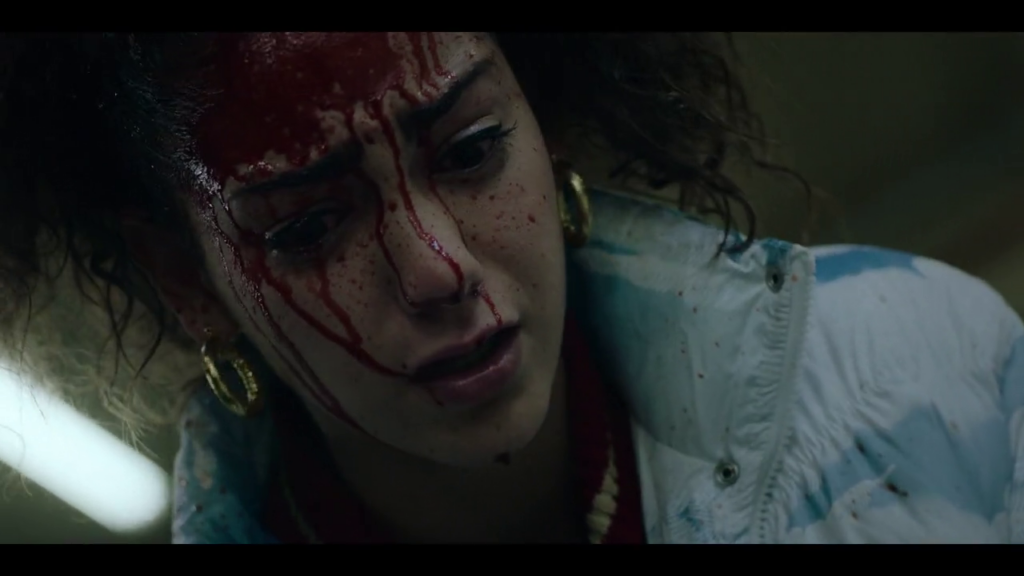
This sequence carries itself like a dramatic climax, but it doesn’t have the satisfaction of one. When you break it down, it’s a bunch of loosely associated plotlines inelegantly crashing into each other, and it’s completely unintuitive how any one character’s success or failure might impact the larger story. It leaves me more irritated than stimulated; what is all this sound and fury meant to progress us towards?
Well, in fairness, in the last scene we do get a clear indication of where things are heading next. From out of the freezing river, the elusive BMW driver drags Billy ashore, while Elliot watches in the distance. Cradling Billy in his arms, the mysterious figure pulls down his hood, revealing his face for the first time, and it’s…

…Oh, God-dammit.
- Review Series: Gareth Evans
Is It Good?
Not Very Good (3/8)
More Gangs of London reviews
Andrew is a 2012 graduate of the University of Dundee, with an MA in English and Politics. He spent a lot of time at Uni watching decadently nerdy movies with his pals, and decided that would be his identity moving forward. He awards an extra point on The Goods ranking scale to any film featuring robots or martial arts. He also dabbles in writing fiction, which is assuredly lousy with robots and martial arts.

